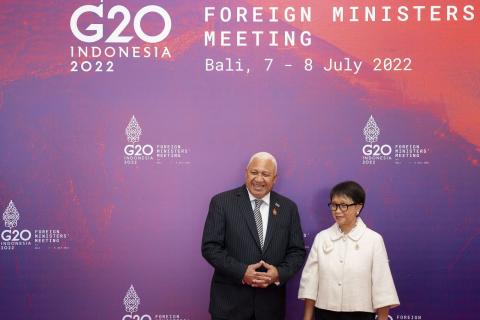
This is an important moment for Fiji.
Today Australian Foreign Minister Julie Bishop makes her first visit to Fiji as part of the Pacific Islands Forum's Ministerial Contact Group. Foreign ministers from Australia, New Zealand, Papua New Guinea, Samoa, Tuvalu and Vanuatu are due to meet Fiji's Attorney-General Aiyaz Sayed-Khaiyum and Foreign Minister Ratu Inoke Kubuabola as well as the Electoral Commission, registered political parties, civil society organisations and trade unions. The Ministers will formulate policy positions that will guide the Pacific Islands Forum's approach to Fiji after elections due in September.
Julie Bishop will also conduct a separate meeting with Prime Minister Bainimarama.
In Julie Bishop, Fiji has a new minister with an open mind who is committed to normalising bilateral relations. True to her earlier commitments to pursue normalisation of relations with Fiji, she sent very deliberate signals to the Fiji Government with this interview on Australia Network yesterday. She discussed normalisation, said she was not imposing conditions on her discussions, and canvassed the rebuilding of economic and defence ties. She said travel sanctions were under review and she flagged more support for elections.
Former Coalition Foreign Minister Alexander Downer, who was responsible for the original smart sanctions on Fiji after the 2006 coup, has re-entered the debate on Fiji this week. Declaring himself opposed to sanctions and acknowledging that Bainimarama is in a strong position which Australia cannot do much about, he has lent support to Bishop's plans to normalise relations.
The Bishop visit presents a big opportunity for Fiji. For all the bad blood between the two countries since the 2006 coup, the Fiji Government knows Fiji's economy is heavily reliant on Australian tourists and Australian investment and trade.
An Australian foreign minister for the first time has indicated that she wants to normalise relations and comes to meetings in Fiji without defined expectations. A landmark meeting between Bishop and Prime Minister Bainimarama is on the agenda, a positive development which elevates Australia's relationship with Fiji from one conducted by officials to a political one, a move which I have argued would be timely.
Yet the Fiji Government has a history of missing opportunities to reset the relationships damaged by its 2006 military coup. [fold]
It has wasted many an opportunity offered by changes of government in Australia and New Zealand and several changes of foreign minister in Australia (Bishop is the fifth Australian foreign minister Fiji will have dealt with since Bainimarama took power in 2006) to have a dialogue about improving relations.
Fiji has not only missed opportunities with Australia. After Fiji made a big effort to expand its relationship with Papua New Guinea in April last year, Fiji Foreign Minister Kubuabola used a speech in Brisbane in July to not only to castigate Australia but insult Papua New Guinea. PNG Prime Minister Peter O'Neill has since been less than friendly, choosing to visit New Zealand instead of attending Bainimarama's inaugural Pacific Islands Development Forum in August, and making life difficult for Fiji's major investments in his country, with pressure put on Fiji TV's investment in PNG's EMTV.
Before the new foreign minister sets foot in Fiji, the Fiji Government has reverted to its favourite strategy of vilifying the Australian Government. Attorney General Aiyaz Sayed-Khaiyum has been openly critical of Australia's sanctions and dismissed overtures from the Australian High Commission.
The Fiji Government needs to think seriously about how it manages its engagement with Julie Bishop. If Bainimarama and Sayed-Khaiyum adopt a friendly stance and are forthcoming about election preparations and their own political intentions, they could induce a constructive policy response from Australia. If they adopt their publicly belligerent manner in their private meetings, they are unlikely to secure Bishop's trust. Even foreign ministers have their pride, and if Bishop is harangued and insulted, her continued commitment to normalising relations with Fiji might be tested.
For her part, Bishop needs to have a few concessions to put on the table before the elections to give her an advantage in what are likely to be difficult discussions. She already has electoral assistance on offer. She could also offer to start preliminary military-to-military talks about renewing defence ties after the elections. Consistent with the Abbott Government's commitment to economic diplomacy, Bishop could also propose an initiative where officials and private sector representatives from both countries meet to discuss ways trade and investment relations could be enhanced.
Bishop has demonstrated some adroit handling of the media over the last week in relation to her visit to Papua New Guinea and in preparation for the Fiji visit. Her decision to have ABC New Zealand correspondent Dominique Schwartz accompany her to Fiji is clever. It sends a valuable signal about Australia's interest in media freedom. But just as importantly, because Fiji journalists are reluctant to report anything not approved by the Fiji Government, Schwartz's presence means Australia and the region have a reasonable chance of learning what is really going on.
